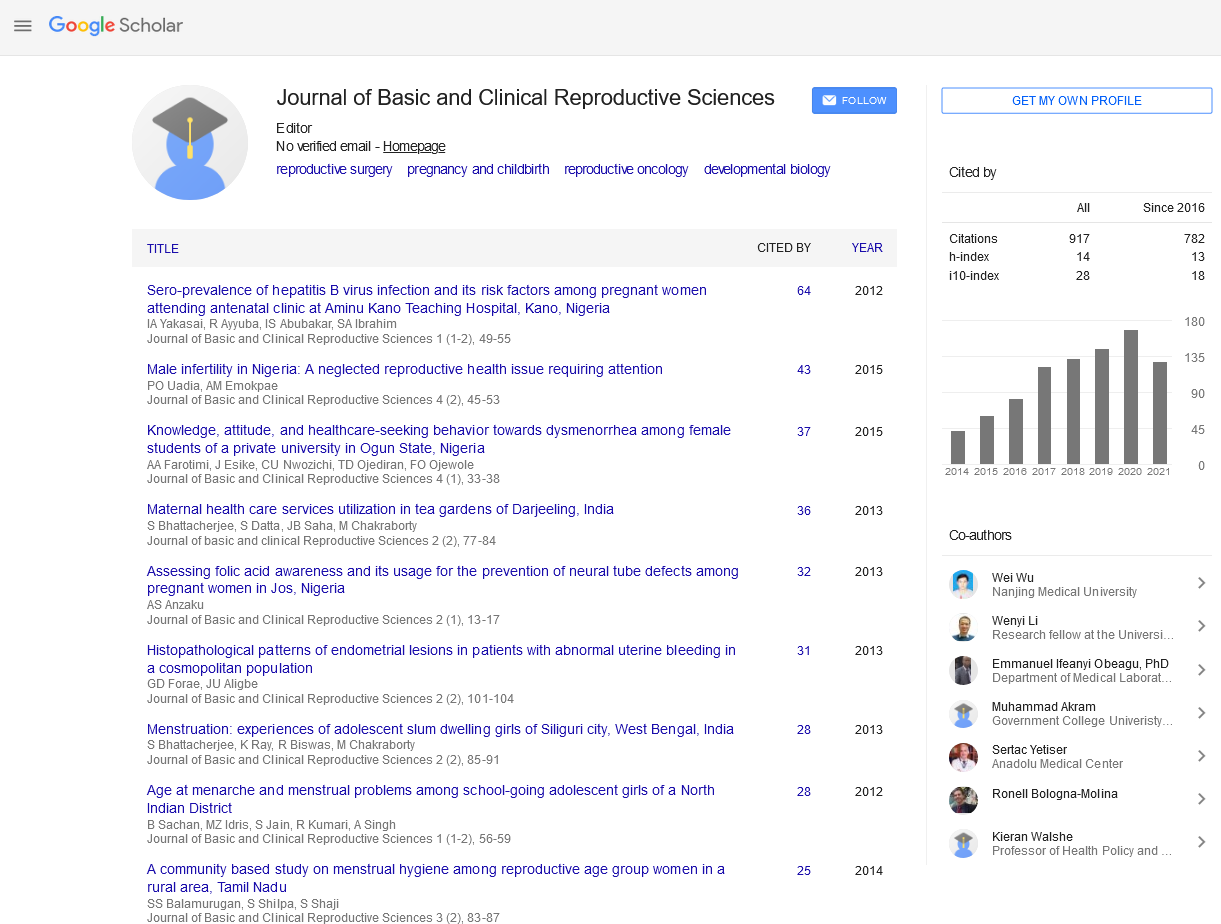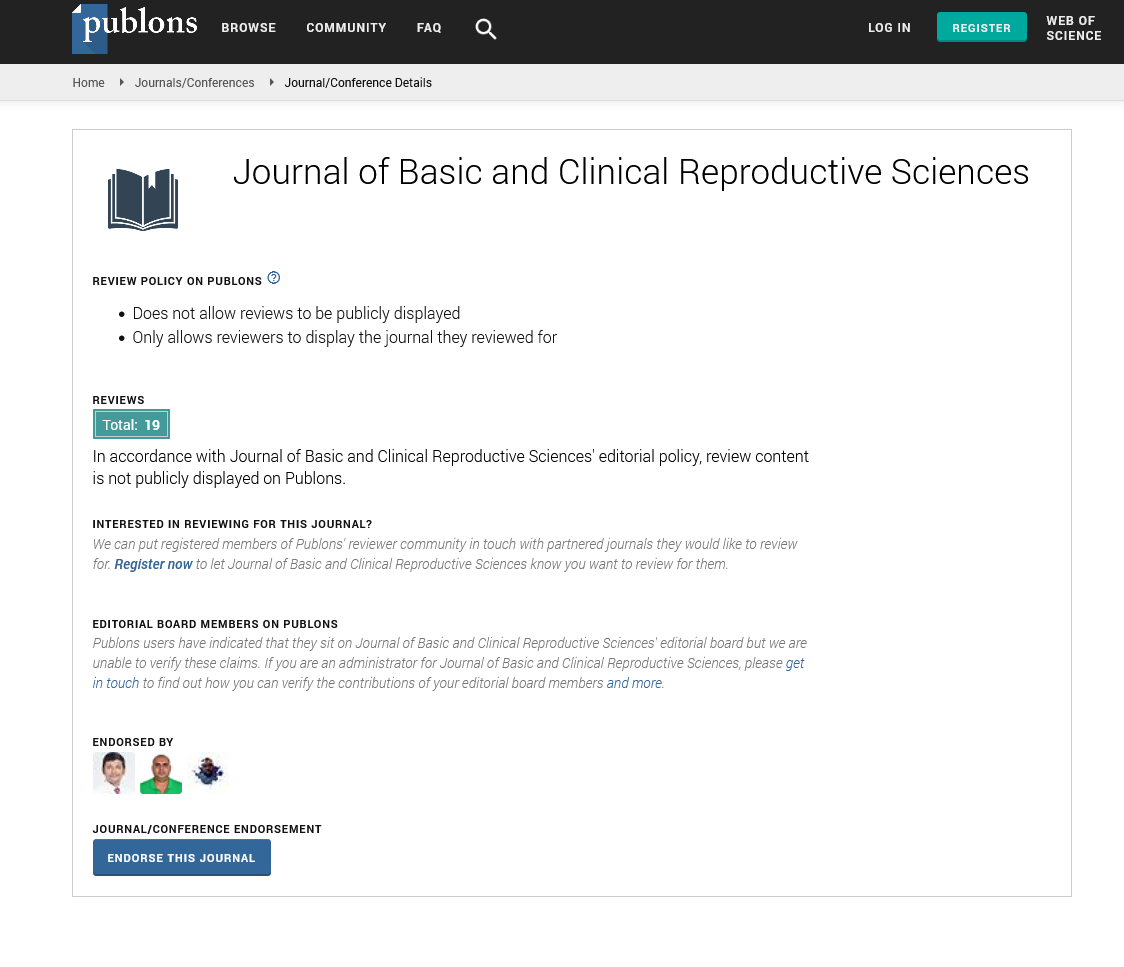Perspective - Journal of Basic and Clinical Reproductive Sciences (2023) Volume 12, Issue 4
Techniques and Technologies in the Field of Maternal-Fetal Medicine
Received: 31-Jul-2023, Manuscript No. JBCRS-23-114371; Editor assigned: 02-Aug-2023, Pre QC No. JBCRS-23-114371 (PQ); Reviewed: 16-Aug-2023 QC No. JBCRS-23-114371; Revised: 23-Aug-2023, Manuscript No. JBCRS-23-114371 (R); Published: 30-Aug-2023
This open-access article is distributed under the terms of the Creative Commons Attribution Non-Commercial License (CC BY-NC) (http://creativecommons.org/licenses/by-nc/4.0/), which permits reuse, distribution and reproduction of the article, provided that the original work is properly cited and the reuse is restricted to noncommercial purposes. For commercial reuse, contact reprints@pulsus.com
Description
Fetal medicine, also known as maternal-fetal medicine, is a subspecialty of obstetrics dedicated to monitoring and managing the health of both the mother and the developing foetus during pregnancy. Fetal medicine, a specialized branch of obstetrics, has witnessed significant advancements over the years, revolutionizing prenatal care and improving the diagnosis and management of fetal conditions. The field has evolved significantly, transforming the way healthcare professionals assess fetal well-being and diagnose fetal conditions. This manuscript delves into the history, importance, and ethical dimensions of fetal medicine. Fetal medicine has its roots in the early 20th century when obstetricians first began using tools like stethoscopes and fetoscopes to monitor fetal heart sounds. Over time, technological advancements such as ultrasound, fetal monitoring, and Non-Invasive Prenatal Testing (NIPT) have revolutionized the field. The development of these technologies has enabled earlier and more accurate diagnosis of fetal abnormalities and health conditions. Fetal medicine plays a pivotal role in prenatal care and offers several critical benefits. It enables the early detection of congenital abnormalities, allowing for timely intervention and treatment planning. It helps assess the risk of complications during pregnancy, such as preterm birth or preeclampsia. Fetal medicine specialists can develop treatment plans for various fetal conditions, including congenital heart defects and chromosomal abnormalities. It provides emotional support to expectant parents by addressing concerns and providing information about the baby’s health. Pregnant individuals should be provided with comprehensive information about fetal testing and treatment options to make informed decisions. Prenatal diagnosis of severe fetal abnormalities can lead to difficult decisions about whether to continue the pregnancy, raising ethical dilemmas. Maintaining the privacy of sensitive fetal health information is crucial. Ensuring equitable access to fetal medicine services is an ethical imperative.
Advancements in fetal medicine
Advanced ultrasound imaging: High-resolution ultrasound technology has become even more precise, allowing for detailed visualization of fetal anatomy, blood flow, and organ function. 3D and 4D ultrasounds provide three-dimensional views and real- time images of the fetus, enhancing diagnostic accuracy.
Non-Invasive Prenatal Testing (NIPT): NIPT has become a standard screening tool for chromosomal abnormalities such as Down syndrome. It involves analysing fetal DNA from maternal blood, offering high sensitivity and specificity without the risk associated with invasive procedures.
Fetal Magnetic Resonance Imaging (MRI): Fetal MRI provides additional information about fetal development and can be particularly valuable for evaluating brain and spinal cord abnormalities.
Fetal surgery: Advancements in surgical techniques and technology have made fetal surgery more feasible for conditions such as spina bifida, twin-to-twin transfusion syndrome, and congenital heart defects. Minimally invasive procedures, like fetoscopic surgery, reduce risks to both mother and fetus.
Fetal therapies: Targeted therapies, such as stem cell transplantation, gene therapy, and drug interventions, are being explored for treating certain fetal conditions before birth.
Future directions
The field of fetal medicine continues to evolve, with ongoing research and innovations .The potential for gene editing techniques, such as CRISPR-Cas9, to correct genetic defects in utero is a topic of active research. Scientists are exploring the development of artificial placenta systems to support premature infants in the womb. Advances in genomics and personalized medicine may enable tailored treatments for individual fetal conditions. Telemedicine is expanding access to fetal medicine services, allowing remote monitoring and consultations.
Conclusion
Fetal medicine has transformed prenatal care, offering earlier and more accurate diagnoses of fetal conditions and enhancing the overall health of both mother and baby. As technology continues to advance, fetal medicine will play an increasingly important role in ensuring healthy pregnancies. It is essential to navigate the ethical considerations surrounding this field with sensitivity, respect for autonomy, and a commitment to providing comprehensive and compassionate care to expectant parents. Advancements in fetal medicine have revolutionized prenatal care, offering new tools for early diagnosis and intervention, ultimately improving pregnancy outcomes and infant health. As technology continues to advance, the field holds the promise of further breakthroughs in personalized medicine and treatments, ensuring healthier pregnancies and brighter futures for expectant parents and their babies.


